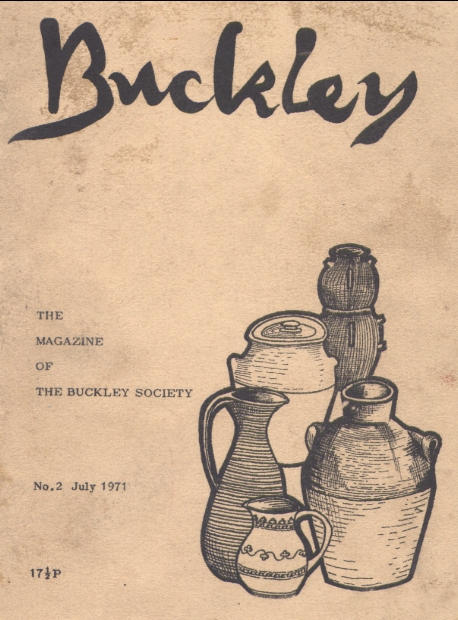
Buckley Society Magazine Issue Two cover"

July 1971
The article below is a review of the Buckley magazine by the editor of The Chronicle on September 24th 1971.
STILL POSSIBLY THE MOST INDIVIDUALISTIC COMMUNITY IN ALL FLINTSHIRE
I have one or two good friends in Buckley and when I drive or walk through the town I wonder afresh how it has kept its flavour and individuality through so much change.
Buckley has possibly the most individualistic community in all Flintshire. Welsh - and yet not so much so. English - and yet not so much so. Accent and intonation and way of life all their own. Something like Yorkshire, where they go their own gate to some purpose.
Originally, I suppose, Buckley represents a transplant of the Five Towns in Wales. Mugs, pots, bottles, and clay. But this is not to say that you are in Arnold Bennett country in the Buckley of today.
There are scars and vestiges of the old industry and the place, so full of character derived from the past and moulded by the present, still has not particular design, unless it be in the extraordinary linear structure of the main street.
There are new housing estates interleaved, so to say, with the older fabric, and how much integration there is I have not sufficient knowledge to say. But of this I am certain - Buckley folks have a pride in their place, they speak their minds (sometimes critically, of course) and they are conscious of a certain residual uniqueness in this Anglo-Welsh county.
Flint takes a sidelong glance at the castle and thinks, well, that's that: it was all a very long time ago and nothing much to do with us today. In Buckley the past still shapes the present.
I find some of this feeling expressed in the No. 2 issue of Buckley (17 1/2p), magazine of the Buckley Society, a copy of which Mr. Charles Duckworth laid on my desk this week.
The editorial has an immediate, yet nostalgic and somewhat wistful tone. I take the liberty of quoting:
"During the past year the prospect of large urban growth for Buckley (and the whole of eastern Flintshire) has excited ardent souls who 'feel the future in the instant'. The quotation comes, aptly as I would think, from 'Macbeth'.
"Undoubtedly the possibilities are immensely attractive. Rising land, property and rateable values; a busy economy, greater civic amenities, a larger social life. More of everything…more shops, pubs and cinemas, parks and gardens; a theatre, museum, art gallery; we may even run to a Fourth Division football team.
"But when we consider that in all advanced (I use the term without commitment) countries, living in cities is one of the greatest sources of discontent and instability; when we see (every Sunday) the eagerness of town-dwellers to retire into the Welsh landscape; it may be that the brilliance of the prospect is clouded by some small shadow of a doubt.
"Certainly the quickening pace with which the traces of the past are obliterated and the almost incredible repetitiveness of the shapers of our varied and curious and individual history a pursuit more satisfying and an end more desirable than ever".
Researching the files of the Chester Chronicle, Mr. Duckworth records a whole section of social history in his study of the Buckley Friendly Societies, one of which survives, appropriately named the Royal Perseverance Lodge.
Harold Gregory writes about Cold Arbour house, dating from the late eighteenth century; and there is a memoir of the Rev. Harry Drew, Vicar of Buckley 1897-1904, by J. Clifford Jones. Mr. Drew came to minister to a town of some 7,000 people "mainly of the labouring class, working in the brickworks, potteries and collieries and on the farms… They were in Wales but not of Wales.
James Bentley continues his investigation into the old Buckley tramways and tunnels; F. W. Cropper, a native of Buckley, sends from Leeds a letter of personal recollections; coalmining in Flintshire in the sixteenth century is the subject of an article by K. Lloyd Griffith; and John Aitken looks at the inflationary factor operating in wages and prices more than a century ago.
What has all this to do with the Present? It is the link with the founding fathers, with the "frontiersmen" who made Buckley a special community in an alien land. The longer this "curious and individual history" continues the less likely it is that Buckley will be overwhelmed by a standardised, repetitive environment.
Vitality thrives on renewal based on the strength of the past.
Author: Editor, Chester Chronicle
Tags
Year = 1971
Month = July
Document = Journal
Work = Light Industry
Extra = 1970s
Copyright © 2015 The Buckley Society